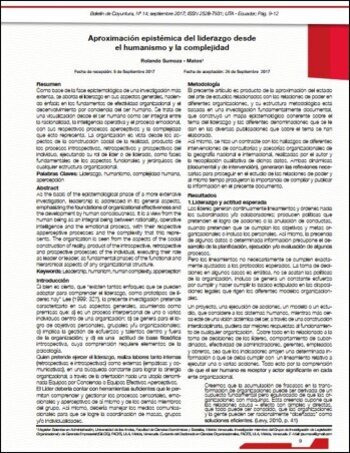Epistemic approach to leadership from humanism and complexity
Main Article Content
Abstract
As the basis of the epistemological phase of a more extensive investigation, leadership is addressed in its general aspects, emphasizing the foundations of organizational effectiveness and the development by human consciousness. It is a view from the human being as an integral being between rationality, operative intelligence and the emotional process, with their respective apperceptive processes and the complexity that this represents. The organization is seen from the aspects of the social construction of reality, product of the introspective, retrospective and prospective processes of the individual, executing their role as leader or leader, as fundamental phases of the functional and hierarchical aspects of any organizational structure.
DOI: https://doi.org/10.31164/bcoyu.14.2017.637
URL: http://revistas.uta.edu.ec/erevista/index.php/bcoyu/article/view/637
Downloads
Article Details

This work is licensed under a Creative Commons Attribution-NonCommercial 4.0 International License.
![]()
The publications of the Boletín de Coyuntura are licensed under a Creative Commons Attribution-NonCommercial 4.0 International License (CC BY-NC 4.0). The Universidad Técnica de Ambato retains the copyright of the published works, and favors and allows the reuse of these, as long as: the authorship and original source of publication is cited, and they are not used for commercial or onerous purposes. The intellectual property of the published articles belongs to the authors.
References
De Gregory, W. y Volpato, E. (2002). Capital Intelectual, Administración Sistemática. McGrawHill: Colombia.
Ferrater, J. (2006). Diccionario de Filosofía abreviado. Primera edición colombiana. Bogotá: Colombia.
Lee, B. (1999). El Principio del Poder. Grijalbo: México.
Levy, A. (2010). Desarrollo Competitivo y Dinámica de los Sectores Industriales. Libro en Versión Electrónica. Universidad de Buenos Aires. Buenos Aires: Argentina.
Martínez, M. (2009). La Psicología Humanista, un nuevo paradigma psicológico. Trillas. México.
Pantoja, M. (2006). Estilos Cognitivos. Revista Creando, versión digital. Año 2, No. 5. Universidad Nacional de Colombia. Manizales: Colombia.
Reynoso, C. (2006). Complejidad y el Caos: Una exploración antropológica. Disponible en la web en: http://d.yimg.com/kq/groups/13334744/747498768/name/Complejidad%2By%2B-Caos%2B-%2BUna%2BExploracion%2BAntropologica.pdf. Buenos Aires, Argentina.
Rojas, E. (2001). ¿Quién eres?, de la personalidad a la autoestima. Editorial Planeta: Colombia.
Taha, H. (1981). Investigación de Operaciones. Representaciones y Servicios de Ingeniería S.A. México.
Torres, E. (noviembre 2007). La Programación Neurolingüística como Herramienta Estratégica para el Gerente Negociador en la Resolución de los Conflictos Laborales. Revista Electrónica Lex Laboro. Universidad Rafael Belloso Chacín (URBE). Volumen III. Maracaibo: Venezuela.
Van Gigch, J. (2004). Teoría General de Sistemas. Décima reimpresión. Trillas: México.


